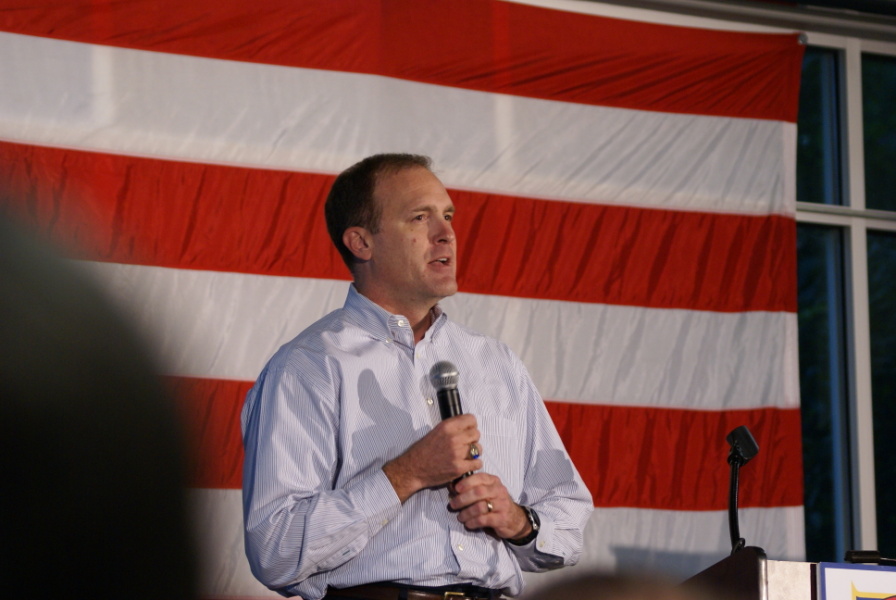| Prev |
heroicrelics.org USSRC Saturn/Apollo Reunions Site Index Fourth Annual Saturn/Apollo Reunion (2007) Gallery |
Next |
Jim Halsell
Jim Halsell was next to address the audience:
Thank so much, and then you ladies and gentlemen.
This is, for me, a very special occasion. I get a once-in-a-lifetime opportunity to try to express from my generation to the one that preceeded me a sense of thanks and gratitude for what you did. I represent not only a generation of astronauts but a generation of Americans who watched you go to the moon, persevere in the face of obstacles, problems, challenges, and disasters and yet you succeeded still. You demonstrated with your actions, in addition to with your words, what it really meant to be an American. And I want to thank whoever thought to put this American flag up behind me, because this is what it's about. [applause]
As a child growing up as you were going to the moon, I learned when my Dad went out in the back yard and he put four stakes up in the back yard with a piece of string around to make a square, and he went to the garage and got a shovel and he started digging. And this was about 1963, as best as I can remember.
Think back to what was happening in 1962 and 1963. America was battling for its survival. As far as we could tell, we were losing and communism was winning. We were fighting for our very survival. Now, I asked my Dad, "What is this hole that you're digging in the back yard?" And he said, "Son that's going to be where you and your mother and your son get down when" -- notice I say "when" and not "if" -- "the Russians drop the atomic bomb."
That was the sense that we had at that time. To a seven- or eight-year-old, it was really grabbed me and really took me out of that Walt Disney world of Daniel Boone and coonskin caps and made me realize that there was something very special and very important going on. To each and everyone one of you who contributed to the success of winning Space Race and showing the world that being an American -- and the American ideals of democracy, of freedom, of liberty -- was not only the best way to live your life as an individual, but it was also that we had a system that could take on these tough technological problems, and we could win. And we would win again in the future. And you demonstrated to my generation what it was all about.
I want to thank you for preserving America and our ideals. [applause]
The second part of my thank you is personal, but it's also on behalf of my generation to yours. And it's a thought that that night, in July of 1969, there must have been a million of us who were nine, ten, eleven, twelve -- we were right at that point in our lives when we were starting to think about our future, think about the possibilities. And we literally sat on the edge of our seats as we watched Americans walk on the moon -- those fuzzy images going across the TV screen, Walter Cronkite explaining to us what was happening -- and even at that tender age, we could understand that this was a historic, monumental event. And then millions of us walked outside that night and we looked up at the moon and we were able to make this connection, for the first time in our lives, that something special happening on the TV was happening right there on that moon, right now. And it kind of made a once-in-a-lifetime, dramatic impact and it made us think about -- you know this thing about "if you can dream it, you can do it" -- it's not just a catch-phrase; it's real, and these people are demonstrating to me with their actions. What can I do with my life? Where might I be able to go? What kind of life of excitement and adventure when I try to grab and reach onto -- what kind of fulfillment, what kind of achievement, or what kind of contribution might I be able to make?
That night, for millions of American children such as myself, that's when we made the leap -- the first step, if you will -- into an adulthood, a life of excitement and adventure that a lot of us are still living to this day. And we have you to thank for it. Thank you very much. [applause]
Larry Capps introduced Steve Cook, the evening's final speaker:
And now I'm going to introduce one of that newer generation. As the Director of the Exploration Launch Projects Office at Marshall Space Flight Center, our next speaker manages one of NASA's key exploration initiatives: Designing and developing the new launch vehicle systems that will enable missions to the moon, to Mars, and beyond.
He's been likened to Dr. Wernher von Braun because he so understands the importance of engaging the public in the exploration initiatives.
Steve Cook received his bachelor's degree in aerospace engineering and mechanics from the University of Minnesota in Minneapolis and joined NASA as a lead systems engineer in the Preliminary Design Office. Serving in numerous leadership positions within NASA, he now is responsible for the overall management and direction of the launch vehicle projects at Marshall, including design, development, vehicle integration, and testing.
Ladies and gentlemen, it is my great pleasure to welcome the to podium the man who is leading us back to the moon, Steve Cook.

| Time picture taken | Fri Jul 13 19:44:30 2007 |
| File name | dsc39645.jpg |
| Location picture taken |
Space Camp Cafeteria US Space & Rocket Center Huntsville, AL |
| Prev |
heroicrelics.org USSRC Saturn/Apollo Reunions Site Index Fourth Annual Saturn/Apollo Reunion (2007) Gallery |
Next |